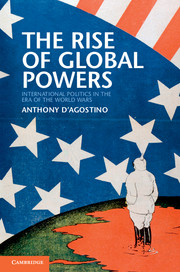Book contents
- Frontmatter
- Contents
- Maps
- Acknowledgements
- Introduction
- 1 The great powers at the dawn of world politics
- 2 Global origins of World War I: from the China scramble to the world crisis of 1904–1906
- 3 Global origins of World War I: a chain of revolutionary events across the world island
- 4 Balance and revolution, 1914–1918
- 5 A ragged peace, 1919
- 6 Scramble for Eurasia, 1919–1922
- 7 Drastic acts of unhappy powers, 1922–1923
- 8 Storms in the lull, 1924–1927
- 9 Politics and economics of the great slump, 1928–1933
- 10 A vogue for national economy
- 11 Mussolini’s moment, 1933–1935
- 12 The global civil war, 1936–1937
- 13 Last years of peace, 1937–1939
- 14 The European war, 1939–1941
- 15 The world war
- 16 Balance and hegemony
- Maps
- Notes
- Index
10 - A vogue for national economy
Published online by Cambridge University Press: 05 June 2012
- Frontmatter
- Contents
- Maps
- Acknowledgements
- Introduction
- 1 The great powers at the dawn of world politics
- 2 Global origins of World War I: from the China scramble to the world crisis of 1904–1906
- 3 Global origins of World War I: a chain of revolutionary events across the world island
- 4 Balance and revolution, 1914–1918
- 5 A ragged peace, 1919
- 6 Scramble for Eurasia, 1919–1922
- 7 Drastic acts of unhappy powers, 1922–1923
- 8 Storms in the lull, 1924–1927
- 9 Politics and economics of the great slump, 1928–1933
- 10 A vogue for national economy
- 11 Mussolini’s moment, 1933–1935
- 12 The global civil war, 1936–1937
- 13 Last years of peace, 1937–1939
- 14 The European war, 1939–1941
- 15 The world war
- 16 Balance and hegemony
- Maps
- Notes
- Index
Summary
The year 1933 saw the greatest transformation in our inquiry into the relations among the great powers and their expansion. It marks the low point of the slump, soon to be called the “Great Depression,” eclipsing the previous “great depression” of 1873 to 1896. Political values underwent a transvaluation at the low point of the slump. Or so we would say now. At the time, it was not so generally realized. Up to 1933 it was still easy for Europeans to think of France as the main problem, “French hegemony,” as the common phrase had it. Once Hitler had come to power, some observers, but unfortunately not most, perceived on the contrary that France was in fact part of the solution to the real problem, which was the German “solution” to the problem of the Versailles peace. It was one of those points in history that required a reversal of the previous signs.
At this moment Adolf Hitler and Franklin Delano Roosevelt came into office within a few weeks of each other. They would both leave the stage within a few weeks of each other in 1945. During the intervening dozen years they were actually the keenest political adversaries in the world, largely because Roosevelt chose to have it that way. Hitler did his best in his first years in power to avoid notice, in order to proceed with the rearmament of Germany as quietly as possible, knowing it could be stopped by any forceful action on the part of Germany’s neighbors if they were to perceive the threat. At first, neither Hitler nor Roosevelt wanted the rest of the world to grasp the depth of their antagonism. Eventually it became impossible not to notice.
- Type
- Chapter
- Information
- The Rise of Global PowersInternational Politics in the Era of the World Wars, pp. 248 - 267Publisher: Cambridge University PressPrint publication year: 2011

